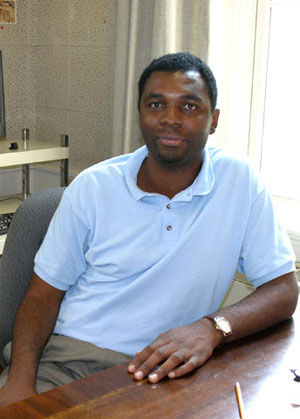Classroom discussion excites Kenneth Ngwa. Growing up in Bamenda, Cameroon, most of his classes were lectures.
"We didn't have books or large libraries, so taking notes during class was the only way we could obtain this knowledge," says the visiting assistant professor of religion, a tall man with large hands but a surprisingly gentle voice. "When I came to the United States I could find it all in the library, come to class prepared to discuss it and become a true participant in learning. I realized how teaching and learning were intertwined. And as I have become a teacher, I have realized that through teaching, we also learn."
Wabash students experienced Ngwa's enthusiasm for discussion during their first weeks in his Old Testament course. They were studying the Book of Job when Hurricane Katrina hit the Gulf Coast.
 "Wisdom is very practical," the ordained Presbyterian minister says. "Wisdom is knowing how to live in this world. It is about theories, but also about the translation of these theories into everyday life."
"Wisdom is very practical," the ordained Presbyterian minister says. "Wisdom is knowing how to live in this world. It is about theories, but also about the translation of these theories into everyday life."
So Ngwa's students sought wisdom by forming a panel discussion and pondering the disaster from the viewpoint of the characters in Job. "I was pleasantly surprised—amazed, actually—at how much thought they gave to it," Ngwa said.
Professor Ngwa was raised applying wisdom to the every day needs of life. His mother, Catherine, was a leader in the Presbyterian Church, founding in Cameroon a school for pastors' wives that has become a highly respected college for women.
"I learned from my mother that you start by changing things at the personal level, then the community level, and you grow from there," Ngwa says. His parents also taught him compassion for the poor in his country. Their suffering led him to study economics.
"I needed to know how this system worked," he said. But his direction changed when he read Jonathan Edwards' fiery sermon, Sinners in the Hands of an Angry God.
"I looked at society and asked, 'Where is justice?‚' I did not see it in economics. But I noticed the overlap between people's religious beliefs and the way society is shaped, and I came to believe that the roots of what I was looking for might be in religion."
Ngwa attended seminary and from 1995 to 1997 served 650 parishioners in a rural area near Wum, Cameroon, chairing the committee that brought clean drinking water to the town.
Transferred to Dschang to be chaplain of a university, he encountered students with a different set of challenges.
"At this university, people come from across Africa from very different ethnic backgrounds, languages, and worldviews. On any given topic, you will have 10 different opinions. Students struggle to find their own identity."
The potential for friction is enormous, as seen in recent intertribal wars and the genocide in Rwanda. Ngwa offered the solution in an ancient text.
"I referred my students to the Israel of the Old Testament, which was a confederacy of very diverse tribes," Ngwa said. "Israel was created as a nation not when one tribe wiped the others out, but when they all decided that the many tribes needed to come together."
He believes the example has universal relevance.
Ngwa continues to find the more he studies the Old Testament and the wisdom writings, the more relevant they are to today's students.
"My calling is to be a teacher," the professor says, "and the driving force behind that is my belief people are most productive when they know their alternatives and can make wise choices. It is my hope that I can help equip them to make those choices that will be most productive for themselves, and for their communities."
Charles is Editor of Wabash Magazine.